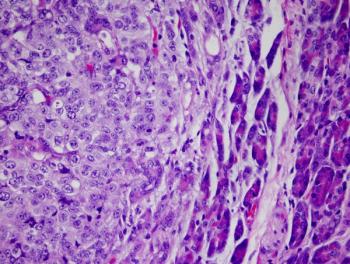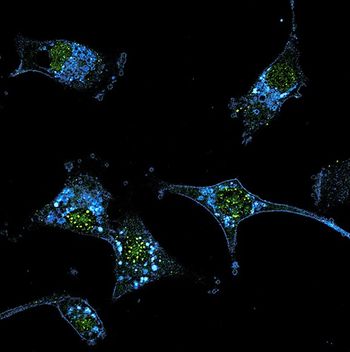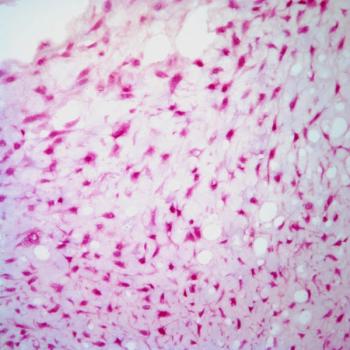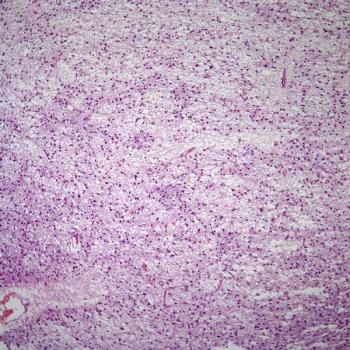
Subcutaneous amivantamab proved noninferior vs intravenous administration in EGFR-mutated non–small cell lung cancer.

Your AI-Trained Oncology Knowledge Connection!


Subcutaneous amivantamab proved noninferior vs intravenous administration in EGFR-mutated non–small cell lung cancer.

Subgroup findings suggest a PFS benefit with the addition of encorafenib/binimetinib in patients with liver metastases.

Updated MARIPOSA results found improves progression-free survival in patients with high-risk EGFR-mutant advanced non-small cell lung cancer when treated with amivantimab/lazertinib.

Continued survival was observed in dabrafenib/trametinib combination after 8 years follow-up in patients with advanced melanoma.

Byoung Chul Cho, MD, PhD, highlights ongoing trials assessing intravenous and subcutaneous amivantamab in EGFR-mutant non–small cell lung cancer.

An AI-based system may reduce the time needed to match patients with cancer to suitable clinical trials.

Lorlatinib may show “unprecedented” improvements in outcomes for those with advanced ALK-positive NSCLC, according to Benjamin J. Solomon, MBBS, PhD.

Investigators may continue to reevaluate the benefits of the AI navigator MyEleanor over time in other patient populations.

Access to fertility preservation may help mitigate toxicity associated with chemotherapy and other agents in those with breast cancer.

Rates of HPV-related cancers may be decreased in patients under 40 have received an HPV vaccine.

Experts from University of California, Los Angeles Health and Mayo Clinic discuss key data presented at the 2023 American Society of Clinical Oncology (ASCO) Annual Meeting in the gynecologic and gastrointestinal cancer spaces and how they may impact patient care.

Combination therapy with nivolumab and relatlimab produces superior progression-free survival vs nivolumab monotherapy among those with advanced melanoma in the phase 3 RELATIVITY-047 trial.

mRNA-4157 plus pembrolizumab appears well tolerated without an increase in immune-mediated adverse effects vs pembrolizumab monotherapy among those with high-risk melanoma in the phase 2 KEYNOTE-942 trial.

Targeting apoptosis in BRAF V600-mutated melanoma may be considered for future exploration in the post immunotherapy setting, according to an expert at Moffitt Cancer Center.

The safety of fianlimab plus cemiplimab appears consistent with the safety profile previously observed with each individual agent among patients with previously treated metastatic melanoma in a phase 1 study.

Sintilimab plus chemoradiotherapy produces a higher 3-year distant metastasis-free survival rate vs chemoradiotherapy alone among patients with advanced nasopharyngeal carcinoma in the phase 3 CONTINUUM trial.

Treatment with eftilagimod alpha in combination with pembrolizumab appears safe and well tolerated among patients with metastatic head and neck squamous cell carcinoma in the phase 2 TACTI-002 study.

Most adverse effects in a phase 2 trial related to doxorubicin appear to be expected in the treatment of patients with soft tissue sarcoma.

With no standard treatment available, darolutamide shows potential activity among patients with androgen receptor–positive salivary gland cancer in the phase 2 DISCOVARY trial.

Cabozantinib plus nivolumab and ipilimumab appears to improve progression-free survival vs cabozantinib alone among patients with metastatic soft-tissue sarcoma in a phase 2 trial.

Common treatment-emergent adverse effects among patients receiving PRT811 for uveal melanoma or advanced glioma include nausea and vomiting in a phase 1 study.

Trastuzumab deruxtecan may become a new therapy option for patients with HER2-positive tumors, according to an expert from The University of Texas MD Anderson Cancer Center.

Treatment with tovorafenib appears well tolerated among pediatric patients with low-grade glioma, according to findings from the phase 2 FIREFLY trial.

Nirogacestat also appears to improve progression-free survival compared with placebo among those with desmoid tumors in the phase 3 DeFi trial.

In the study, 331 patients with IDH-mutated low-grade glioma were randomized to receive oral vorasidenib at 40 mg once daily or matched placebo in 28-day cycles.

Results from the RESTORE study indicate that a cognitive behavioral stress management app improves symptoms of anxiety and depression.

Results from a phase 1/2a trial show that efficacy was maintained when BNT211 was used with or without a CLDN6-encoding mRNA vaccine for patients with relapsed/refractory advanced solid tumors.

Medicaid expansion may help overcome inequities in access to care for pancreatic and gastric cancers, with notable benefit in Black patients, according to an expert from The University of Texas MD Anderson Cancer Center.

A positive R0 resection rate helped to confirm the noninferiority of minimally invasive distal pancreatectomy compared with open distal pancreatectomy in those with resectable pancreatic cancer.

The appearance of circulating tumor DNA and androgen receptor aberrations yielded lower overall survival rates for patients with metastatic castration-sensitive prostate cancer during the phase 3 TITAN trial, according to Agarwal, MD.